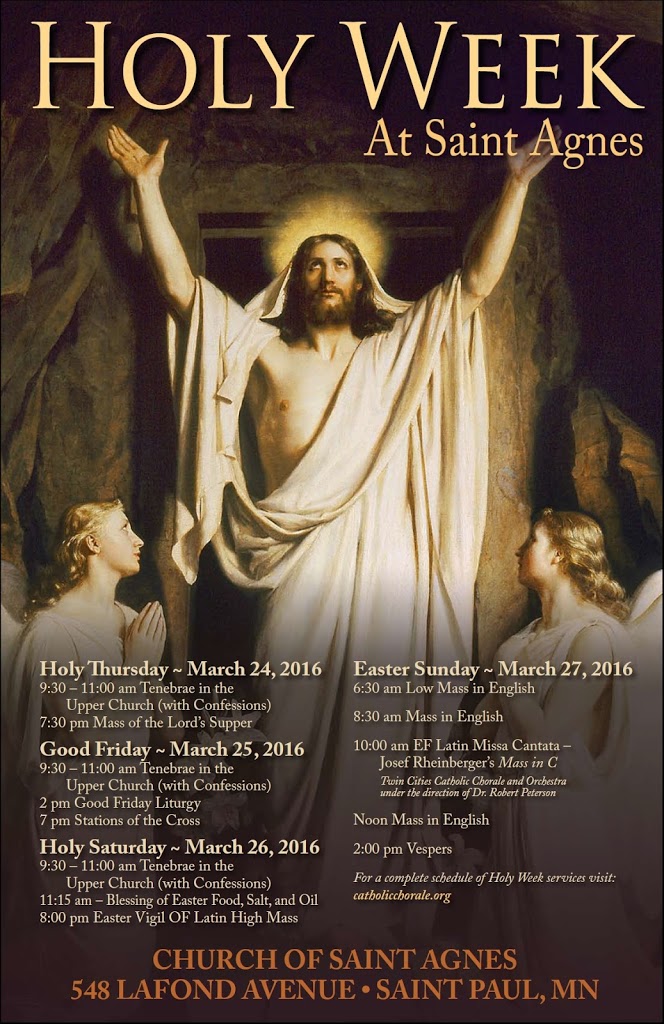This just came to my attention.
Christ, the Firstfruits
The Mandatum is the New Confirmation
The disparity of opinions over the meaning of Confirmation can be easily discerned from the various age groups confirmed in different dioceses. A seven year old, confirmed before First Holy Communion, is a sign that the catechetical leadership of a diocese firmly believes that Confirmation is a Sacrament of Initiation. An eighth grader’s Confirmation is something of a rite of passage. And a 15 year old’s Confirmation, with its weight of 2 years’ mandatory CCD classes, interviews, service projects, sponsor eligibility forms, quizzes on the seven gifts, and essays, perhaps suggests that the sacramental life is personally demanding, and requires an “adult commitment.”
The disparity of praxis regarding the Holy Thursday Mandatum likewise shows how interpretations of its significance differ. All might well agree that the gestures reflect the willingly accepted self-abasement of our Savior, as described by St. Paul in 2 Cor 5:21 and 8:9, and most famously in Philippians 2:7: “He emptied Himself.” Thus the stripping of the priest’s clothes in some way signifies Christ’s unwillingness to be “greedy” (harpagmos, Phil. 2:6) about His divinity. As St. Augustine writes:
He laid aside His garments, when, being in the form of God, He emptied Himself; He girded Himself with a towel, took upon Him the form of a servant; He poured water into a basin, out of which He washed His disciples’ feet. He shed His blood on the earth, with which He washed away the filth of their Sins; He wiped them with the towel wherewith He was girded; with the flesh wherewith He was clothed, He established the steps of the Evangelists; He laid aside His garments, to gird Himself with the towel; that He might take upon Him the form of a servant, He emptied Himself, not laying aside indeed what He had, but assuming what He had not. Before He was crucified, He was stripped of His garments, and when dead was wound up in linen clothes: the whole of His passion is our cleansing.
But what exactly is signified by the washing of the feet?
In the dialogue of the Gospel scene, Jesus explains to Peter that being washed is necessary if one is to have a part with Him. In this way, it represents Baptism. The word given to a catechumen is a cleansing word, but not of the feet of clay, of sin. The washing is of the Twelve in the upper room, on the night they were entrusted to make the perpetual remembrance of the Eucharist. The washing of their feet is a prelude to the washing of each others’, and others’ feet.
In this sense, then, the ritual has the sense of apostolic preparation. Origen beautifully writes:
Our Lord insinuates that this is a mystery. By washing and wiping, He made beautiful the feet of those who were to preach glad tidings (Isaiah 52:7), and to walk on that way of which He tells them, I am the way. Jesus laid aside His garments that He might make their clean feet still cleaner, or that He might receive the uncleanness of their feet to His own body, by the towel with which alone He was girded: for He has borne our griefs. Observe too, He chose for washing His disciples’ feet the very time that the devil had put it into the heart of Judas to betray Him, and the dispensation for mankind was about to take place. Before this the time was not come for washing their feet. And who would have washed their feet in the interval between this and the Passion? During the Passion, there was no other Jesus to do it. And after it the Holy Ghost came upon them, by which time they should already have had their feet washed. This mystery, our Lord says to Peter, is too great for you to understand now, but you shall know it hereafter when you are enlightened.
One key to celebrating our Liturgy well, I think, is to somehow manage to say everything that is meant by the ritual, without omitting any of its richness. Over-emphasis of one aspect tends to “thin out” other aspects, sometimes neglecting them entirely.
My sense is that it would be best not to superimpose on any liturgical action a weight that it cannot sustain without compromise. Instead, other extra-liturgical expressions are readily available to make the same point. For example, 15 year olds could make pilgrimages or willingly work on behalf of others on service projects that are not a “sacramental requirement,” but an outgrowth of the gifts of the Holy Spirit. In other words, the ardors of the Christian commitment could be expressed in non-liturgical ways.
Overall, it seems to me that a good discipline of the Sacraments builds up the Body of Christ in ways that are mysteriously strengthening, for the life of the world. If salt becomes tasteless, what good is it? If the branches are not in the vine, how can they have life in themselves–much less give life to others?
Nos autem gloriari!
Gregorian Institute of Canada – Chant Colloquium 2016
CHANT COLLOQUIUM 2016
August 11-14, 2016
Saint Augustine’s Seminary, Toronto
The Gregorian Institute of Canada is pleased to announce its 11th Annual Colloquium, to be held at St. Augustine’s Seminary, Toronto, ON, August 11-14. Our plans include a series of practical chant workshops ranging from introductory to advanced, featuring the outstanding clinician Adam Bartlett, composer and editor of Simple English Propers (CMAA, 2011), and editor of the Lumen Christi Missal, Lumen Christi Simple Gradual, and Lumen Christi Hymnal (Illuminare Publications, 2012-2015).
Active as a teacher, workshop leader and speaker, Adam has traveled widely offering catechetical and training workshops on topics of Catholic sacred music and liturgical chant.
The colloquium also includes a series of scholarly papers in honour of the late Andrew Hughes, renowned Canadian chant scholar and Professor at the University of Toronto.
In addition to the workshops and lectures, there will be daily offices and Sunday mass sung with Gregorian Chant.
For More Information, visit the Gregorian Institute of Canada’s website at www.gregorian.ca
Preliminary Program
Registration Form pdf
St. Rita Conference, May 19th to May 21st, 2016
I’m very, very jealous of folks in Texas right now because of this upcoming conference. (And it takes a lot to make people in Florida envious of Texans.)
Why? The St. Rita Conference in May which will feature a new cantata by one of my favs, Frank La Rocca. I’ve already played most of his debut CD, “In This Place,” on my weekly radio show.
Learn more about the conference, the cantata, and the composer. And gosh, I wish I could get to Texas.
Holy Week Schedule – St. Agnes Parish, St. Paul, MN
Join the Twin Cities Catholic Chorale and Orchestra for Holy Week. For more information, visit their website at catholicchorale.org.





